Senior Iranian Cleric Claims Late President Unfit to Succeed Supreme Leader
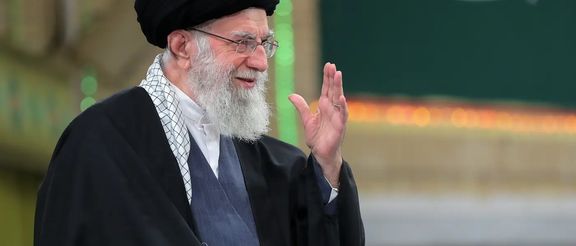
Mohammad Ali Movahedi Kermani, head of Iran's Assembly of Experts, has stated that late President Ebrahim Raisi was unfit to succeed Ali Khamenei as Iran's Supreme Leader.

Mohammad Ali Movahedi Kermani, head of Iran's Assembly of Experts, has stated that late President Ebrahim Raisi was unfit to succeed Ali Khamenei as Iran's Supreme Leader.
"He would have definitely rejected the offer if it had been made," Kermani stated, directly addressing speculation about Raisi's potential ascension.
The sudden death of Raisi in a helicopter crash in May abruptly ended what some believed was his grooming for leadership, propelling Khamenei's son, Mojtaba, into the spotlight as a new frontrunner.
The comment highlights the opaque process of choosing Iran's leader, a position that will become vacant following ageing Khamenei's death.
The Assembly of Experts, elected to serve until 2032, is responsible for appointing the next leader, though the identity of the successor remains a closely guarded secret.
The Supreme Leader of Iran is chosen by the Assembly of Experts and serves for life. Article 111 of the Constitution of the Islamic Republic of Iran mandates that if the current Supreme Leader dies or is removed from office, the Assembly of Experts must convene immediately to name a successor.
In the interim, a 'Provisional Leadership Council' takes over the duties of the Supreme Leader. This council consists of the sitting President, the Chief Justice, and a cleric from the Guardian Council selected by the Expediency Discernment Council.
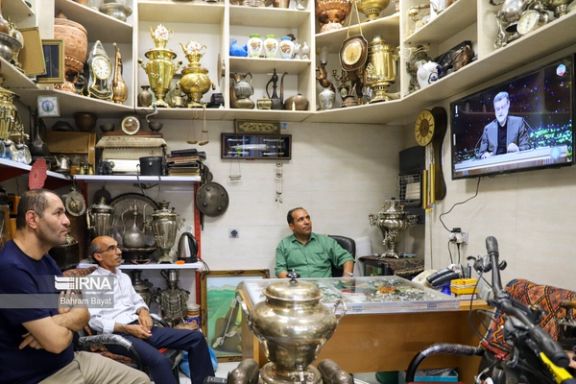
Iranian media and most social media users agree that the second and third televised "debates" among the six hand-picked presidential candidates in Iran last week were even more disappointing than the first one.
As the candidates prepare for their fourth debate on Monday, which will focus on foreign policy, observers are eager to see if any interesting issues or statements will emerge.
Many Iranian journalists, such as Sahand Iranmehr hesitated to call the second debate a "debate" as it was a series of individual monologues or sometimes a conversation between two of the candidates, Rouydad24 website observed.
Among the many problems noted by the media and netizens were the slow pace of the debates, the overly long introduction covering the candidates' arrival, prayers, and their walk through the state TV building, their awkward mumbling of the national anthem (which few knew by heart), and the repetitive, uninspired introduction by the state TV anchor. Even more annoying was the way the candidates were treated like naughty schoolboys in need of constant advice.
Regarding the form and format, these programs seem designed to discourage viewership. Everything about the setting is dull, tasteless, and rather banal. The scheduled 12-minute intermission on Thursday stretched to over half an hour, during which a helpless presenter repeated irrelevant information four times before the candidates returned to the studio, some still chewing the snacks offered by the organizers.
However, the content of the "debates" was even more problematic than the format. There was no meaningful difference among the candidates or their statements. Nearly everyone, except for cleric Mostafa Pourmohammadi in the second debate, who briefly outlined his plans for the presidency, seemed clueless about what they would do if elected.
Many, including the reformist candidate Masoud Pezeshkian said they did not need a plan because they were going to go ahead carrying out Supreme Leader Ali Khamenei's master plan for the country's future.
On the other hand, there was hardly any good speaker among them apart from Pourmohammadi. Some like Mohammad Bagher Ghalibaf and Alireza Zakani had many blunders that social media users joked about later. Zakani's remarks about helping pregnant women turned out to be too embarrassing while his remarks about giving gold to citizens in lieu of cash handouts were so outlandish that it was evident even in the mimics of other candidates.
Pezeshkian even did not defend himself against many attacks by his political rivals particularly Zakani, news websites in Tehran noted. His only significant statement was that he wanted to continue the path started by former reformist President Mohamad Khatami in the late 1990s. This prompted Zakani to say sarcastically that if Pezeshkian is elected president, his government will be Khatami's third term of office as President.
Former President Hassan Rouhani and former Roads and Urban Planning Minister Abbas Akhundi were so offended by some of the remarks made by conservative candidates that they asked for airtime to respond the accusations. As candidates have been "ordered" not to criticize the Raisi administration, they often make offensive remarks about Rouhani and his ministers and blame them even for problems that occurred under the Raisi administration.
Most of chronic problems the country faces, such as a 50% annual inflation rate, are largely the result of US economic sanctions, related to Iran’s nuclear program that is not the domain of any president to decide.
Many critics have noted that pro-reform candidate Masoud Pezeshkian's insistence on not differentiating himself from the conservative candidates is likely to negatively impact voter turnout in the upcoming election. Disillusioned voters may see no positive impact from his election.
Overall, the three rounds of debates on state TV have highlighted several issues with the candidates. They are not effective speakers, lack clear plans, and appear out of touch with Iranian society, showing little understanding of what Iranians want. They tend to create controversies because they have little to discuss about essential issues. Most importantly, none of them seem to have a clear reason for wanting to be Iran's President.
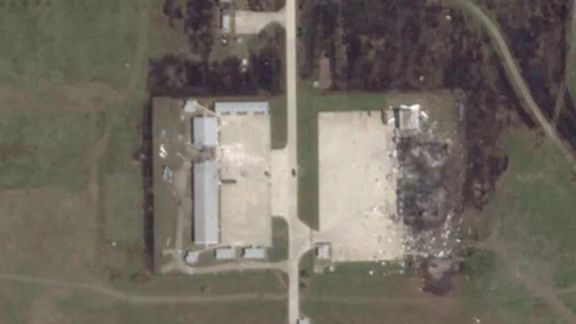
Ukraine's Navy has revealed satellite imagery showing the destruction of a Russian warehouse used for launching Iranian-made drones and training military cadets.
A Facebook post by the Ukrainian Navy detailed, "New satellite images confirm the destruction on the night of June 21 of the Shahed-136/Geran-2 storage and preparation facilities, training buildings, control, and communication points of these UAVs located in the Krasnodar Territory."
Additional images shared on social media depicted the devastation with one warehouse entirely demolished and another significantly damaged. The assault coincides with Russia's claim of downing 114 Ukrainian drones targeting oil refineries and military installations in southern Russia, which purportedly resulted in one civilian casualty from falling debris.
Kyiv's naval officials reported that the strike, which occurred late Friday night, killed several trainers and cadets learning to operate the Iranian Shahed drones which have been used on Ukrainian civilian sites since the war in 2022.
The operation was orchestrated in collaboration with Ukrainian intelligence, highlighting a military response against threats posed by the collaboration between Russia and Iran in utilizing drone technology against Ukraine.
Data from Planet Labs, a US-based satellite company, pinpointed the facility directly across the Sea of Azov from the occupied Ukrainian city of Mariupol.
Russia annexed Crimea in 2014, an action not recognized by the majority of the international community.
Iran has been a key ally to Russia in its conflict with Ukraine. Since mid-2022, Iran has provided Russia with hundreds of Shahed kamikaze drones, which have been widely used to attack civilian infrastructure and urban areas in Ukraine.
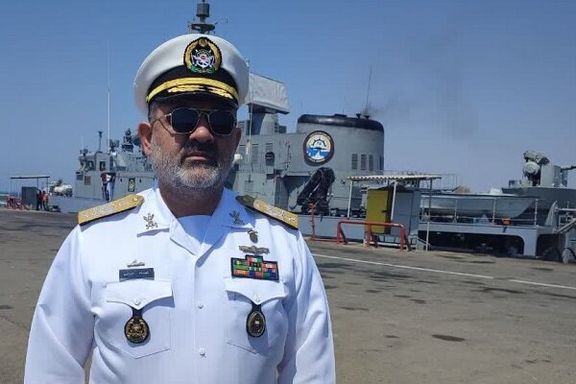
Shahram Irani, the commander of Iran’s Navy, announced that it is a “permanent plan” of Iran's army to maintain a presence on all high seas of the world.
“Currently, the Islamic Republic's naval fleet is present in the Gulf of Aden to support the security of shipping," Irani said Sunday, without referring to the fact that Tehran-backed Houthis have been attacking commercial vessels in the Red Sea and the Gulf of Aden since November.
Irani said that the Iranian Navy also assists ships from other countries in distress.
However, a recent incident highlighted a contradiction in Iran’s stated mission of aiding ships in distress. The United States Central Command (CENTCOM) reported on June 16 that the Iranian frigate IRIN Jamaran ignored distress calls from the Palauan-flagged, Ukrainian-owned bulk cargo carrier M/V Verbena after it was hit by two separate missile attacks by the Houthis.
“The Iranian frigate IRIN Jamaran was eight nautical miles from M/V Verbena and did not respond to the distress call.”
CENTCOM condemned the inaction of the Iranian vessel while referring to a pattern of "malign and reckless behavior" by the Iranian-backed Houthis, asserting that such actions "threaten regional stability and endanger mariners' lives across the Red Sea and Gulf of Aden."
In his Sunday remarks, Irani also referred to the presence of "enemy ships" in the area, saying it "does not advance their cause, and the damage inflicted on gigantic ships by the small group of Yemeni Houthis proves this point."
The statement comes amid an ongoing US-led multinational coalition military operation, initiated in December 2023, responding to Houthi aggression.
As proxies of Iran, the Houthis started targeting maritime commercial traffic in mid-November, following a call from Iran’s Supreme Leader Ali Khamenei for Muslim countries to blockade Israel. Initially confined to the Red Sea, these attacks subsequently extended into the Indian Ocean.
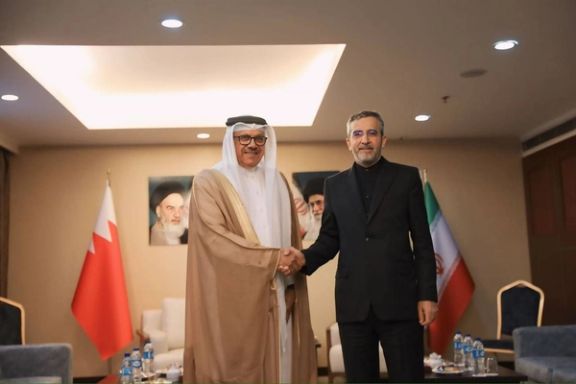
Bahrain's foreign minister Abdullatif bin Rashid Al Zayani visited Tehran on Sunday for the second time in a month, as the two countries prepare to resume their diplomatic ties after an eight-year hiatus.
The Bahraini top diplomat, who is in Tehran to participate in the Asian Cooperation Dialogue summit, met his Iranian counterpart Ali Bagheri Kani to discuss resumption of bilateral relations, eight years after Manama severed its ties with Tehran.
Bahrain's foreign minister and his Iranian counterpart agreed to establish "the mechanisms required for initiating talks aimed at resuming political relations between the two countries" during their meeting in Tehran, a joint statement released by the two countries reads.
The Bahraini foreign minister visited Tehran last month to attend a farewell ceremony held for Iran's President Ebrahim Raisi after he was killed in a helicopter crash.
Now his second visit to Tehran comes one month after Bahrain's king expressed a tentative willingness to resume diplomatic ties with Iran despite historical tensions and accusations against Tehran for inciting unrest within Bahrain’s Shi'ite majority.
Tiny but geopolitically significant Bahrain, hosting the US Navy's Fifth Fleet, has repeatedly accused Iran of destabilizing efforts by fueling dissent among its Shi'ite population against the ruling Sunni monarchy. The 2011 protests, a part of the broader Arab Spring movement, were suppressed by the government, with Iran being partly blamed for the upheaval—a charge Iran has consistently denied.
The kingdom has a long-standing alignment with US and UK interests, notably highlighted by its sole Persian Gulf state endorsement of the strikes against the Iran-aligned Houthis in Yemen following their Red Sea confrontations earlier this year.
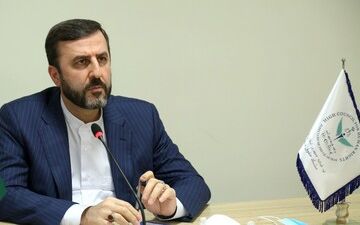
Iran says Canada is violating the human rights of Iranian expatriates by not allowing them to cast absentee votes in the upcoming presidential elections slated for June 28.
Kazem Gharibabadi, the Secretary of Iran's High Council for Human Rights, said Sunday that it is a “violation of human rights” to leave many Iranians without possibility to cast their ballots in Canada.
"After Canada severed diplomatic relations with Iran, we no longer have any political representation in Canada, and a vast number of Iranians there are deprived of consular services. How are Iranians supposed to participate in the presidential elections there? Is Canada's action against human rights or not?" he said.
While Canada has not provided absentee voting for Iranian expatriates, the Biden administration has permitted Iran's government to establish absentee ballot stations across the US for the upcoming presidential votes.
The decision has sparked outrage among critics who view it as legitimizing the Islamic Republic’s "authoritarian rule".
The Presidential Election Headquarters of the Islamic Republic of Iran in the United States and Canada, which is run by Iran's Interests Section in Washington DC, recently said in a statement that "consultations are underway regarding the establishment of polling stations and the feasibility of absentee and postal voting" to facilitate voting "for fellow Iranian compatriots residing in the United States and Canada."
Since 2012, Canada and Iran have not maintained formal diplomatic relations. In the absence of direct diplomatic presence, Italy serves as the protecting power for Canada in Iran, while Switzerland fulfills this role for Iran in Canada.
Canada cut off diplomatic relations with Iran and shut down its embassy in Tehran due to several concerns including Iran's support for the Assad regime amid the Syrian civil war, failure to adhere to UN resolutions on its nuclear activities, ongoing threats against Israel, and concerns for the safety of Canadian diplomats, especially after attacks on the British embassy in Iran.
Furthermore, Canada designated the Iranian government as a state sponsor of terrorism under the Justice for Victims of Terrorism Act and the Canadian Department of Foreign Affairs and International Trade discouraged all travel to Iran by Canadian citizens.
Further straining bilateral relationships with Tehran, Canada on Wednesday designated Iran's Revolutionary Guards Corps (IRGC) as a terrorist organization. The move, supported by the families of the victims of Ukraine International Airlines Flight PS752—which was shot down by the IRGC in January 2020—marks a significant escalation in Canada's stance against Iran.
In response, Gharibabadi called the move by Canada "hostile" and defended the IRGC as a key element of Iran's national security apparatus responsible for countering terrorism in the region.
The official designation of the IRGC as a terrorist organization aligns Canada with other nations taking a firm stance against Iran's aggressive activities.